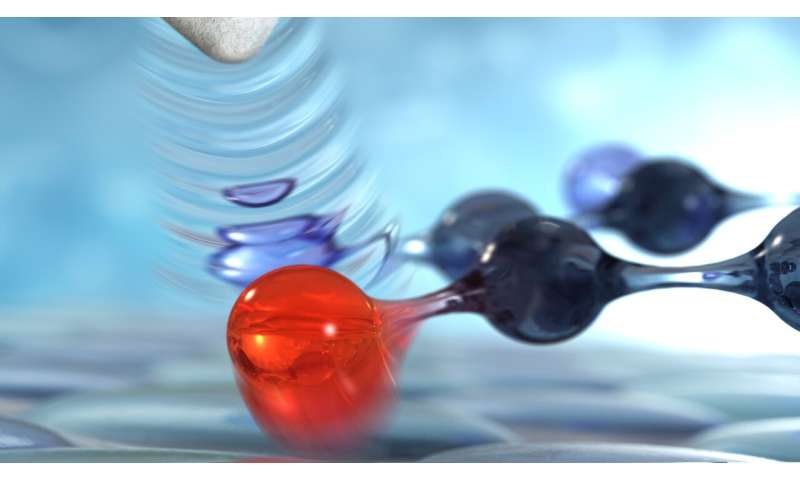The nanoworld in super-slow motion

New flagship programme for doctoral students in Regensburg approved
How can quantum computers be made more suitable for everyday use? How to make photovoltaics more efficient? How does nature collect light and transport energy in organisms so efficiently? And what can we learn from this for next-generation technologies? Pressing questions like these are as central to modern natural sciences as they are to innovations in nano-, bio- and quantum technologies. To really answer them, we would need to be able to observe the elementary building blocks of matter as directly as possible. But since electrons, atoms and molecules are constantly in motion, microscopic still images are often insufficient to develop such an understanding. Instead, one would need ultrafast videos of the nanoworld—a long-standing dream shared by scientists around the globe.
The University of Regensburg can now further expand its leading position in this research field: Today, the German Research Foundation (DFG) has decided to support the doctoral training in this future-oriented topic in Regensburg with its own Research Training Group. Starting April 2024, the new Research Training Group 2905, entitled "Ultrafast nanoscopy—from single particle dynamics to cooperative processes", will be funded for five years with a total of six million euros. It will be hosted in the unique interdisciplinary environment of the newly emerging research centre RUN (Regensburg Center for Ultrafast Nanoscopy).
Building on recent breakthroughs, a radically new strategy for visualising the dynamics of matter at the quantum level is being pursued. Novel concepts of nanovideography will be pioneered to resolve atomic-scale elementary dynamics and to trace ensuing cooperative processes in systems of increasing complexity directly in ultraslow-motion pictures. To clarify key questions on dynamics of systems ranging from individual molecules to more complex biomolecular and solid-state nanostructures, complementary methods, such as lightwave scanning tunnelling microscopy, time-resolved momentum microscopy, ultrafast near-field nanoscopy, super-resolution microscopy, atomic force microscopy, and cryo-electron microscopy will be employed. The doctoral researchers will be involved in close collaborations between experiment and theory, and between physics and biology.
"The possibility of recording actual movies from the nanoworld may well trigger a scientific revolution comparable to the invention of steady-state scanning-probe and electron microscopy," says Prof. Dr. Rupert Huber, the spokesperson of the new GRK 2905. He is certain: "Our slow-motion cameras downright guarantee our doctoral researchers to observe processes in the nanocosmos that nobody has ever seen before. Exploring this mysterious quantum world will be a thrill." The discoveries could find applications in future nano- and optoelectronics, quantum technologies and green technologies. The holistic doctoral training thus opens up excellent career prospects in both academia and industry.
The President of the University of Regensburg, Prof. Dr. Udo Hebel, is delighted: "RTG 2905 is another important third-party funding success for the new RUN, on which I warmly congratulate the applicants from physics and biology. Just a few days ago, Prof. Dr. Christine Ziegler became the fourth researcher at RUN to acquire an ERC Synergy Grant. The RTG 2905 now offers the opportunity to implement such globally visible scientific excellence in interdisciplinary coordinated doctoral training."
A total of twelve scientists from the Institute of Experimental and Applied Physics (Prof. Dr. Isabella Gierz, Prof. Dr. Franz Giessibl, Prof. Dr. Rupert Huber, Prof. Dr. John Lupton, Prof. Dr. Jascha Repp and Prof. Dr. Sascha Schäfer), the Institute of Theoretical Physics (Prof. Dr. Ferdinand Evers, Prof. Dr. Milena Grifoni, Prof. Dr. Klaus Richter and Dr. Jan Wilhelm), the Institute of Biochemistry, Genetics and Microbiology (Prof. Dr. Dina Grohmann) and the Institute of Biophysics and Physical Biochemistry (Prof. Dr. Christine Ziegler) will lead the Research Training Group. With a modern interdisciplinary training programme, which also includes a stay abroad lasting several months, they will enable the doctoral students to thrive in the dynamic research field of ultrafast nanoscopy and gain international visibility.
Information/Contact
Prof. Dr. Rupert Huber
Spokesperson of the RTG 2905
Institute of Experimental and Applied Physics
University of Regensburg
phone: +49 941 943-2070
E-Mail: rupert.huber@physik.uni-regensburg.de
Prof. Dr. Milena Grifoni
Deputy spokesperson of the RTG 2905
Institute of Theoretical Physics
University of Regensburg
phone: +49 941 943-2035
E-Mail: milena.grifoni@physik.uni-regensburg.de
Provided by University of Regensburg